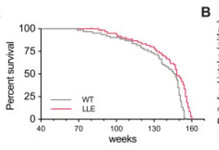Benefitted mice when their water was 3.5% ethanol, mean lifespan extension by 4.4%.

“
Our data showed that the long-term 3.5% ethanol substitution for drinking water had beneficial effects in mice, the daily performance of ethanol-fed mice was enhanced, the athletic ability and healthspan of ethanol-fed mice drastically improved. Furthermore, the ethanol-fed mice showed the resistance to high-fat diet (HFD). When supplemented with 3.5% ethanol, the HFD mice showed reduced multiple organ pathogenicity, increased insulin sensitivity, and decreased NF-kB activation and inflammatory cytokines. These changes caused by ethanol are astonishing and impressive.
It has been well accepted that acute and chronic excessive alcohol exposure is conducive to tissue injury. However, one should be mindful that the injuries caused by the excessive use of alcohol are dose-dependent. In our study, the long term 3.5% ethanol-fed mice did not show the common negative effects of alcohol. At this dose, we did not observe any pathological structural changes in the liver, the heart, or the kidneys; neither did we detect any impairments of learning, memory, and cognition by the water maze.
One of the pathophysiological mechanisms induced by alcohol abuse has been identified as mitochondrial dysfunction. On the other hand, the mitochondrial volume was associated with high levels of physical activity. The improved mitochondrial function of long-term low-dose ethanol-intake (LLE) mice may be due to their high level of daily physical activity and enhancement of athletic ability of LLE mice. In our experiments, we observed that the mitochondrial density in the liver and the skeletal muscles of the ethanol-fed group increased, and the morphology became stronger with more cristae, indicating improved mitochondrial function under the moderate ethanol feeding.
AMPK induces mitochondrial biogenesis and has emerging roles in the regulation of both mitochondrial metabolism and dynamics. Phosphorylation activity of AMPK, necessary for mitochondrial biogenesis via SIRT1 and PGC1a, was increased in the liver of the LLE mice. Considering the activation of AMPK by moderate ethanol intake, it seems reasonable to entertain the hypothesis that the rapid acetate metabolism following the ingestion of ethanol generates sufficient AMP to transiently activate AMPK, which in turn induces the synthesis of certain long-lived proteins that act to boost insulin sensitivity and possibly aid the efficiency of fat oxidation as well.”

“
Our data showed that the long-term 3.5% ethanol substitution for drinking water had beneficial effects in mice, the daily performance of ethanol-fed mice was enhanced, the athletic ability and healthspan of ethanol-fed mice drastically improved. Furthermore, the ethanol-fed mice showed the resistance to high-fat diet (HFD). When supplemented with 3.5% ethanol, the HFD mice showed reduced multiple organ pathogenicity, increased insulin sensitivity, and decreased NF-kB activation and inflammatory cytokines. These changes caused by ethanol are astonishing and impressive.
It has been well accepted that acute and chronic excessive alcohol exposure is conducive to tissue injury. However, one should be mindful that the injuries caused by the excessive use of alcohol are dose-dependent. In our study, the long term 3.5% ethanol-fed mice did not show the common negative effects of alcohol. At this dose, we did not observe any pathological structural changes in the liver, the heart, or the kidneys; neither did we detect any impairments of learning, memory, and cognition by the water maze.
One of the pathophysiological mechanisms induced by alcohol abuse has been identified as mitochondrial dysfunction. On the other hand, the mitochondrial volume was associated with high levels of physical activity. The improved mitochondrial function of long-term low-dose ethanol-intake (LLE) mice may be due to their high level of daily physical activity and enhancement of athletic ability of LLE mice. In our experiments, we observed that the mitochondrial density in the liver and the skeletal muscles of the ethanol-fed group increased, and the morphology became stronger with more cristae, indicating improved mitochondrial function under the moderate ethanol feeding.
AMPK induces mitochondrial biogenesis and has emerging roles in the regulation of both mitochondrial metabolism and dynamics. Phosphorylation activity of AMPK, necessary for mitochondrial biogenesis via SIRT1 and PGC1a, was increased in the liver of the LLE mice. Considering the activation of AMPK by moderate ethanol intake, it seems reasonable to entertain the hypothesis that the rapid acetate metabolism following the ingestion of ethanol generates sufficient AMP to transiently activate AMPK, which in turn induces the synthesis of certain long-lived proteins that act to boost insulin sensitivity and possibly aid the efficiency of fat oxidation as well.”